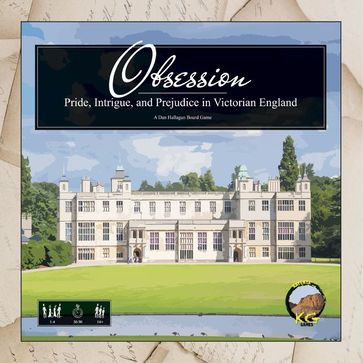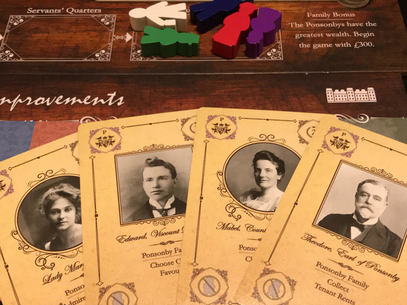 Full Disclosure: Kayenta Games sent me a review copy of Obsession. What is this game about? Obsession, designed by Dan Hallagan of Kayenta Games, isn't technically set in a Jane Austen novel, but it's very much a Pride and Prejudice type of board game. In Obsession, you represent a family that has had a few rough decades, but better times lie ahead—you're starting to improve your estate, and there may even be love in the air! The young and wealthy Fairchilds have moved back to the area, and you have marriageable children who are obviously perfect potential matches for them. The ultimate goal of Obsession is to get victory points, which you can earn in several ways. You will be building impressive add-ons to your estate, trying to meet objectives drawn at the beginning of the game, acquiring fancy new guests for your entourage, and especially trying to catch the eyes of those sexy, sexy Fairchilds. Mechanically, the game is mostly about action selection (deploying your service staff wisely) and hand management (playing the right guests at the right time). During a regular round, you will need to host an event on your property, invite guests, and make sure that the right servants are present to make everything go off without a hitch. As a reward for your fancy parties, you will receive a combination of respect and cold, hard cash. The cash can then be invested in new rooms for your estate, where you can hold bigger and better events. Choose the right areas to develop, and you'll also attract the Fairchild children, one of whom may come and pay you an extended visit. Va-va-voom! How does it play solo? There is a solo mode for Obsession, and it's a lot better than the typical "beat your own score." When playing solo, you can choose from a range of opponents with varying difficulty levels and base scores—victory point amounts that you'll need to beat in order to emerge the winner. Each AI opponent represents a rival family and is represented by a card that shows that family's base score and the level of development that it will be at during each courtship round. If you don't keep up, the AI can steal the Fairchilds' affections away from you and earn extra victory points. AI opponents also have buying priorities and will purchase new properties from the market based on those automated preferences and on die rolls. This keeps the solo game lively, and I like that you can set your level of challenge. One possible quibble with the solo AI, however, has to do with courtship. In a game of Obsession, each courtship round determines who will get a visit from one of the Fairchilds for the season, which provides not only an extra card but some VP perks. If you play with "open courtship," all players can see which aspect of estate building the Fairchilds will prioritize for the season and can plan accordingly. Alternatively, you can play "closed courtship" and get a surprise come season's end. When you are playing solo, this can feel a bit odd, because if you play open courtship, you already know what the AI's score in a given area will be and can concentrate on beating it. If you play closed courtship, you can put your eggs in the wrong basket and get unlucky. I can go either way on this—if you play open, focusing too hard on courtship might mean you aren't pursuing other objectives necessary for victory. If you get a nasty surprise during closed courtship, there are still other ways to earn VP, and thematically I like the idea that you are trying to get a good read on those mysterious Fairchild kids. There is also the Charles Dickens variant(!), in which you reveal the courtship theme card on a random turn during the season, which makes for a nice compromise. Overall Thoughts I think that to get maximum fun out of Obsession, you need to really be committed to the theme—middle school Liz Davidson thought that Colin-Firth-as-Mr. Darcy was the sexiest being in existence. I have read all of the Austen and Brontë novels, plus a... significant... number of Regency romances. I was primed for this game. The flavor text is great, and the theme and mechanics are nicely interwoven. For me, the greatest pleasure of a game of Obsession is making up a story about the guests you throw together at the events you host for them.  If reading Sense and Sensibility or watching Downton Abbey is not your cup of tea, Obsession may not be a good match for you. The graphic design in this game is nothing special. Mechanically, Obsession is interesting—it's a challenge to manage both the guests in your hand and the servants in your household—but it can also be frustrating. Sometimes you need to reach an in-game goal, but you don't have the right guests and just can't seem to pick up anyone suitable from the draw deck. If you choose to pursue an objective that requires specific room tiles, it can be difficult to actually acquire those rooms. The market is fickle, and there aren't many duplicate copies of room tiles to draw. If you're playing Obsession purely for the mechanical process of earning victory points, you aren't going to have as much fun, and the game won't make as much sense. In fact, to really get a sense of the rules, you need to do more than read the main rulebook. There is a second book, a thematic index of everything in the game, that will really give you all the details. Don't let it freak you out--Obsession flows quickly and easily once you have gotten into the rhythm of it. I actually ended up liking the extra glossary because I learned more about a time period I am interested in. However, your mileage may vary. As a solo player, I am delighted to see a solo mode that is truly aimed at my satisfaction as a solo player. Although you can see ahead of time how an opponent's estate will develop from round to round, I just tell myself that I have very nosy servants who are good at surveillance of rival families. I love that there are multiple opponents to choose from, and that those opponents interact with the market in a way that makes me watch the improvement tiles like a hawk. I think Obsession offers a good solution to the "beat your own score" problem found in so many solo games with a Euro vibe to them—I would love to see something like this for Legacy: The Testament of Duke de Crecy, another game I really enjoy that has a similar family-prestige-building theme. Do I recommend it? If you like Jane Austen and can really get into the theme, yes. If a BBC period piece comes on TV and you roll your eyes, run away. Overall Rating: 4 stars Rating Scale: 5 stars — I love it! 4 stars — I really like it. 3 stars — I like it. 2 stars — It's okay. 1 star — Meh.
2 Comments
Michael Bacon
8/7/2019 09:36:07 am
You said that you've warmed up to it a bit more when you initially reviewed it. Would you be interested in rewriting your "Do I recommend it?" paragraph?
Reply
8/7/2019 01:59:21 pm
Actually, I am going to let that stand—I think that if this game's theme does not appeal to you, it might not be a good match. It REALLY appeals to me, and that's a major part of its charm.
Reply
Your comment will be posted after it is approved.
Leave a Reply. |
AuthorMy name is Liz Davidson, and I play solo board games. A lot of solo board games... Archives
August 2021
Categories
All
|
 RSS Feed
RSS Feed